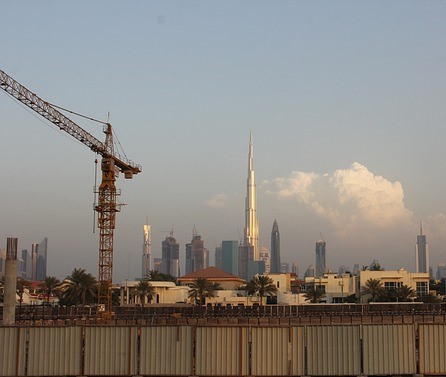Tahseen Consulting’s Wes Schwalje speaks with the Abu Dhabi Council for Economic Development
- All banks in the UAE operate under the provisions of Federal Law No. 6 of 1985 Regarding Islamic Banks - but the Islamic banking industry has evolved significantly since then
- Talent attraction and development is single most worrisome challenge to the evolution of Islamic banking not only in the UAE but globally
When it comes to news on economic trends and policies in the UAE, government and business leaders turn to the Abu Dhabi Council for Economic Development’s Economic Review. Tahseen Consulting is honored to have its work on Islamic finance highlighted in the publication’s August issue. We have posted the full article below.
We supported efforts to restore moderate religious rhetoric across the world.
Learn more about our Public Sector Strategy and Execution here.
Recently, Tahseen Consulting’s Chief operating Officer, Wes Schwalje, spoke with representatives from the Abu Dhabi Council for Economic Development regarding his thoughts on the evolution of Islamic finance in the UAE. In a wide-ranging discussion, Schwalje laid out a broad vision of the future, the need to benchmark best practices for other financial hubs, and how human capital is essential to the UAE’s aspirations.
Abu Dhabi Council for Economic Development: What factors have contributed to the development of Islamic finance in the UAE and in Abu Dhabi in particular?
Schwalje: The global growth of Islamic finance, which has considerably outpaced conventional banking, is a primary factor behind the UAE’s desire to develop its Islamic banking sector.
With the exception of Oman, the UAE has the lowest concentration of Islamic banking assets as a portion of total banking assets in the GCC.
However, the UAE has the highest total banking assets in the GCC. This presents an opportunity for the UAE to unseat some of its competitors in the region, most notably Bahrain, as well as attract international assets to become both the primary financial and Islamic banking hub in the GCC. At the moment Dubai Islamic banks hold 50% of Sharia compliant assets in the UAE while Abu Dhabi banks hold 40%. Abu Dhabi entered the Islamic banking sector with the establishment of Abu Dhabi Islamic bank 22 years after the establishment the UAE’s first Islamic bank the Dubai Islamic Bank.
Abu Dhabi is now trying to position itself, as well as the UAE as a whole, as both a financial and Islamic banking hub that has world class, robust institutions, markets, infrastructure, and regulation.
Federal level intervention to establish and effective legal framework and infrastructure for Islamic finance will have a positive impact on both Dubai and Abu Dhabi which potentially will draw international banks with Islamic banking windows and other conventional institutions to offer Sharia compliant products.
Abu Dhabi Council for Economic Development: How have laws pertaining to Islamic financing developed in Abu Dhabi to help Islamic financial institutions and what laws are needed to help develop it into an Islamic finance hub?
Schwalje: All banks in the UAE operate under the provisions of Federal Law No. 6 of 1985 Regarding Islamic Banks, Financial Institutions and Investment Companies which vests the Central Bank with licensing, supervision, and inspection powers. This law was passed 28 years ago, while the Islamic banking industry has evolved significantly since then. I view four areas of reform as critical to the success of the UAE: Broadening International Financial Activities which requires reform of laws pertaining to cross-border foreign exchange flows, capital mobility, financial intermediation, clearing systems, and active exchanges. Increasing the diversity of market participants which will require reforms related to diversity of financial providers, strengthening institutions, and increasing public understanding of Sharia compliant product.
Product Innovation in Islamic banking is required in the UAE and the region in particular.
This will include developing the capabilities at the federal or institutional level to expand the use and types of Sharia compliant products available as well as promote flexibility in structuring financial products.
Abu Dhabi Council for Economic Development: What other new products do Islamic institutions in the UAE need to develop to grow?
Schwalje: The UAE is a leader in Sharia compliant Islamic bonds. However, there are a whole host of other products which are available in other Islamic hubs which are less developed in the UAE. This included trade and lease financing products for businesses. Wealth management, retirement and healthcare financing, and debt financing for households are not as developed as elsewhere globally. Finally, many equity financing and capital market products which would facilitate economic diversification into high –value added industries, attract FDI, and funds from international capital markets are still underdeveloped.
Abu Dhabi Council for Economic Development: What are the main challenges facing Islamic financial institutions in the UAE and Abu Dhabi in particular?
Schwalje: Talent attraction and development is single most worrisome challenge to the evolution of Islamic banking not only in the UAE but globally. Based on our projections, we estimate that a another $71 billion could potentially enter the Islamic banking system in the UAE by 2015 which would create approximately 7,800 new jobs at Islamic banks in the UAE assuming current asset concentration ratios remain similar. We also project another 500 jobs will be created by 2015 in other Islamic financial services segments.
By 2015, the Islamic financial services sector will double in size from approximately 10,000 employees currently to 20,000.
To meet this growing demand for employees trained in Islamic finance, the UAE will need to significantly broaden its education and training options to ensure availability of human capital does not stall the growth of the sector. While it has a number of current executive training institutions and higher education institutions that target mid-level employees in the Islamic finance sector, the UAE does not have any programs that target new entrants interested in the field or senior level leaders. The UAE also does not have institutions which provide research and analysis that advances the field.
The experiences of Bahrain and Malaysia show that research capabilities and institutions have been key structural feature of Islamic banking systems that lead to product innovation and effective regulation.
Furthermore, many of the masters programs in Islamic banking and finance in the UAE remain general MBAs or masters degrees with very few specialized courses related to practical aspects of Islamic banking that are required by employers. The exceptions are Zayed University and Hamdan Bin Mohammed e-University which have in-depth course offerings in Islamic finance and economics.
Abu Dhabi Council for Economic Development: How can the setting up of a new financial center in Abu Dhabi help Islamic financial institutions and the industry as a whole?
Schwalje:
The UAE’s largest Islamic banks do not presently operate in financial centers. However, the Abu Dhabi World Financial Market has the potential to attract regional banks from the GCC as well as international banks who want to enter the UAE market.
The new financial center also has the potential to enhance the diversity of financial providers in the sector by attracting non-banking financial companies such as mutual funds, insurance companies, and other institutions. However, it is unclear to what extent such a center will be able to operate independently of federal laws which very clearly convey the powers of licensing, supervision, and inspection of Islamic financial institutions to the Central Bank.







































